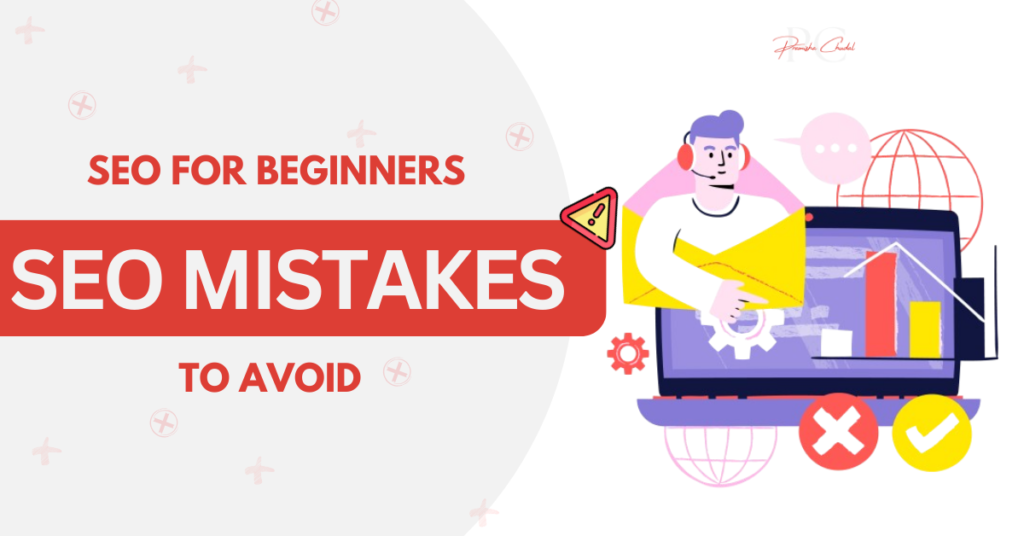Hey, future SEO whiz!
Welcome to the world of SEO, where the right strategies and efforts can help your website shine and stand out in the crowded online space. If you are new to the topic, it might feel overwhelming at first as SEO might sound technical, but don’t worry – I am here to guide you through the basics.
You’re about to embark on a journey that will significantly enhance your online presence and in this post, we’ll explore the fundamental tips of SEO for beginners and highlight mistakes to steer clear of. Ready to get started? Let’s go!
What is SEO and Why is it Important?
SEO, or Search Engine Optimization, is all about making your website easy to find on search engines like Google. It involves various techniques, including keyword optimization, creating high-quality content, and improving site structure to ensure that search engines can easily crawl and index the site.
SEO helps drive organic traffic to websites, increasing their chances of reaching potential customers. Higher search rankings lead to greater visibility, credibility, and trust among users, ultimately contributing to better conversion rates and business growth. By investing in SEO, businesses can stay competitive in the digital landscape and connect with their target audience more effectively.
How to Start Learning SEO?
Starting your SEO journey might seem daunting, but it’s simpler than it looks. Here are some easy steps to get you going:
Understand the Basics
First, get a good grasp of what SEO is and why it’s important. There are plenty of beginner-friendly resources out there, such as blogs, online courses, and YouTube videos. These can provide you with a solid foundation and make SEO less intimidating.
Keyword Research
Next, and most important, you want to learn about keyword research. This involves discovering the words and phrases people use to search for content like yours. There are different paid and free tools for keyword research like Google Keyword Planner, Ahrefs, SEMRush, Google Trends and so on. Think of this as understanding your audience’s language.
On-Page SEO
Once you have a list of your keywords, it’s time to optimize your website’s pages. This means incorporating your primary keyword into your titles, headers, and content. Remember it’s not about keyword stuffing but making sure they fit naturally and enhance your content.
Off-Page SEO
Building your website’s authority is also crucial. This is where off-page SEO comes in, which involves getting backlinks from other reputable sites. Think of these backlinks as votes of confidence from other websites, signalling to search engines that your content is valuable.
Technical SEO
Finally, don’t overlook the technical aspects of your website. Ensure your website is fast, mobile-friendly, and easy to navigate. Technical aspects like site speed, mobile optimization, and secure connections (HTTPS) play a significant role in your site’s overall SEO health.
Remember, starting with SEO is like learning a new skill and it takes time and practice. Keep your learning process engaging and fun, and don’t be afraid to make mistakes. Every step you take will bring you closer to becoming an SEO pro!
Essential SEO Tips for Beginners
Now, let’s dive into some actionable SEO tips for beginners to help you optimize your website:
Use Relevant Keywords
Start by integrating keywords naturally into your content. If your primary keyword is “car detailing in Toronto,” make sure it appears in your title and headers and sprinkle a few times throughout the content. Just remember to keep it natural and avoid keyword stuffing.
Create Quality Content
No matter what, content will always be the king in the SEO world. Always aim to create valuable, engaging, and relevant content for your audience. Think about what your readers are looking for and provide it. Well-researched, informative, and unique content tends to rank better and keeps your visitors coming back for more.
Optimize your Meta Tags
Meta Titles and Descriptions are the first things users see on search engine result pages. Make sure they are compelling and align with Google’s standards.
Google recommends the length of your meta description to be between 155 and 160 characters and the title to be a maximum of 60 characters.
A catchy meta title and description can increase your Click Through Rate (CTR) significantly.
Improve Site Speed
Everyone hates a slow website! So use tools like Google PageSpeed Insights to check and improve your site’s speed.
Simple fixes like compressing images, leveraging browser caching, and reducing server response time can make a big difference in your website.
Mobile Friendly Design
With more people using mobile devices to browse, ensuring your website looks good and works well on every phone is essential.
Google’s Mobile-Friendly Test can help you check this and make necessary adjustments to your content.
Build Backlinks
Building your site’s authority involves getting other reputable websites to link back to yours. This can significantly improve your ranking as Google trust these sites.
You can achieve backlinks through guest bluffing, influencer collaborations, and creating content that others want to share.
Use Alt Text for Images
Search engines can’t read images, but they can read the text associated with them. So, it’s important to use descriptive alt text to help improve your SEO and make your website more accessible to all users.
Create an XML Sitemap
An XML Sitemap helps search engines understand the structure of your website and index it more effectively. Submitting an XML sitemap is like giving search engines a map to navigate your site more easily.
Common SEO Mistakes to Avoid
Even the best of us make mistakes, and bad SEO can hurt your search engine rankings and visibility. While you learning about SEO tips it’s also important to learn about bad SEO practices to stop your website from damaging your website’s ranking and reputation.
Here are some common SEO pitfalls you can steer clear of:
Keyword Stuffing
Overusing your keywords is definitely at the top of the list. Keyword Stuffing is outdated! It makes your content difficult to read and could get you penalized by search engines. Aim for natural, seamless integration of keywords.
Not Updating Content
SEO isn’t a one-time task. If you want to be in SEO for the long run, regularity is the key. Regularly updating your content keeps it fresh and relevant. Search engines favour content that is regularly updated and maintained
Ignoring Internal and External Links
Internal and External Links are key to your website. Ignoring these links is a critical SEO mistake that can harm your site’s performance. Internal links help search engines understand the structure of your site, making it easier for users to navigate and find relevant content while also distributing page authority to boost important pages.
External links to high-quality, reputable websites are essential for providing authenticity and supporting the information on your site. These links show search engines that your content is well-researched and trustworthy, enhancing your site’s credibility.
Including authoritative external links enriches your content, providing additional value to your readers.
Ignoring Analytics
Tools like Google Analytics are essential for understanding what’s working and what’s not. They provide insights into metrics like organic traffic, bounce rate, conversion rate, and a lot more. Overlooking analytics can be the biggest mistake as you may miss out on identifying critical issues, understanding user behaviour, and measuring the effectiveness of your SEO strategies.
Without these insights, you can’t make informed decisions to improve your website’s performance and fall behind competitors who leverage these powerful tools.
Advanced Tips for Continued Success
Once you have got the basics, you might also want to explore a few more tips to keep improving your SEO skills:
Focus on Long Tail Keywords
Long tail keywords are longer and more specific phrases that visitors are more likely to use when they are closer to making a purchase or using voice search. For example: “How to start learning SEO for beginners” is more specific than just “SEO tips.” These keywords are less competitive and can attract more targeted traffic to your site.
Incorporating long-tail keywords into your content can improve your chances of attracting high-conversion traffic and meeting the precise needs of your users.
Leverage Social Media
While social media signals don’t directly affect SEO, they can drive traffic to your site and help build your online presence. Ensure you share your website content on platforms like Facebook, Twitter, and LinkedIn to increase visibility and reach a broader audience. Engaging with your followers on social media, participating in discussions, and encouraging shares and comments can create more opportunities for your content to be seen and linked to, indirectly boosting your SEO efforts. Additionally, social media can help build your brand’s authority and trustworthiness.
Monitor Competitors
Keeping an eye on what your competitors are doing can provide valuable insights and opportunities for your SEO strategy. Tools like Ahrefs and SEMrush allow you to analyze your competitors’ strategies, including their keyword rankings, backlink profiles, and content performance. By understanding what works for your competitors, you can identify gaps in your strategy, discover new keyword opportunities, and learn from their successes and mistakes.
Use Structured Data Markup
Structured data markup, also known as schema markup, helps search engines understand the content of your pages better and can improve your site’s visibility in search results. Implementing structured data can enable rich snippets, which provide more detailed information about your content directly in the search results. This can improve your click-through rates and provide a better user experience. Google’s Structured Data Markup Helper can assist you in adding this markup to your site effectively.
SEO isn’t complicated, it’s just about understanding the basics and when you dive more into it you’ll eventually learn everything.
But remember SEO is a long-term game, but with patience and consistency, you’ll see great results.
So, what are you waiting for? Start your SEO journey today and watch your online presence grow! If you have any questions or need more tips, feel free to reach out. Happy optimizing!

